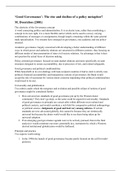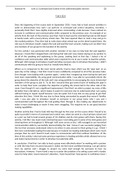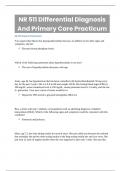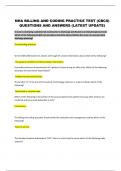‘Good Governance’: The rise and decline of a policy metaphor?
M. Doornbos (2001)
The elasticity of the Governance concept
A word connecting politics and administration. It is an elastic term, rather than constituting a
concept in its own right, it is a more flexible carrier which can be used to convey varying
combinations of messages or consignments, though largely remaining within the same general
trade specialization. Two streams have emerged on governance, one academic and one policy-
oriented.
Academic governance: largely concerned with developing a better understanding of different
ways in which power and authority relations are structured in different contexts- thus focusing on
different modes of inter-penetration of state-civil society relations. An advantage is that it does
not question the actual locus of decision making.
Policy-oriented governance: focused on state-market relations and more specifically on state
structures designed to ensure accountability, due to processes of law, and related safeguards.
Good governance and political conditionalities
While henceforth in its own dealings with loan-recipient countries it had to stick to strictly non-
political, financial accountability and transparency notions of governance, the Bank would
accept the role of secretariat for various donor consortia stipulating what political conditionalities
would need to be met.
Universality and globalization
Two rubrics under which the mergence and evolution and possible eclipse of notions of good
governance might be considered further
1. How universal are standards of good governance put up by the Western donor
community? They don’t go deep, so the same could be argued for universality. Standards
of good governance in principle are conceivable within different socio-cultural and
political contexts, and would constitute a rich field for comparative political anthropology
or political science. Judgments of good and bad vary among cultures. If certain
standards are now advocated globally, this cannot be because they are intrinsically
universal but because the donor world would like to see them being taken up for
universal adoption.
2. If an emerging good governance agenda were to be actively pursued, then in the final
analysis it would constitute one more, potentially key, instrument by which a Western-
derived institutional globalization would be furthered.
Principle and practice
Two aspects worth noting:
1. In the 1990s the launch of good governance became partly focused on the call for multi-
partyism.
, 2. One of the original intentions with the good governance agenda had been to enable
donors to question aids-recipient countries policy structures and processes, and to get
them to alter these according to ‘universal’ criteria and conditionalities as set by the
donors. The idea was to transform what donors perceived as bad governance into good
governance.
From conditionality to selectivity
Good performers are best able to absorb and utilize aids funds effectively. Selectivity can be
advocated and rationalized as being the most cost effective and results-oriented donor strategy.
Criticism has been a lesser concern compared to the perceived operational advantages on which
the Dollar report seemed to open a window.
Conditionality redefined: the Dutch example
Good governance is now assumed to be present to begin with, and has been elevated to one of
the key criteria for selection to the states of most-favored aid-recipient countries as far as Dutch
aid is concerned. In other countries (Denmark e.g.) good governance is a criterion to which
countries are qualifying for assistance. Bad governance will remain bad governance to them. The
question is then, what does good governance mean? It is difficult to define, it may continue as a
general fairly vague term with which to register one’s approval or disapproval of particular
administrative/political practices or of actual governments, although somehow suggesting that
there is a reference to particular higher standards in one’s judgement. Good governance would
then become a political tool to justify and rationalize choices that are made on other, rather
arbitrary grounds.
Contemplating alternative priorities
If good governance is considered a worthwhile objective, why attach conditionalities? Dutch
position: Good governance first, then aid. Countries like Somalia would never receive aid.
Concluding remarks
Within the donor discourse, the notion of ‘good governance’ has thus had quite a remarkable
succession of connotations: at first representing a key objective in donor development and
foreign policy in its own right, one or more donors now would like to treat it as a selection
criterion for aid recipient countries, while more broadly it appears to be evolving into a general
figure of speech without too much practical consequence.
M. Doornbos (2001)
The elasticity of the Governance concept
A word connecting politics and administration. It is an elastic term, rather than constituting a
concept in its own right, it is a more flexible carrier which can be used to convey varying
combinations of messages or consignments, though largely remaining within the same general
trade specialization. Two streams have emerged on governance, one academic and one policy-
oriented.
Academic governance: largely concerned with developing a better understanding of different
ways in which power and authority relations are structured in different contexts- thus focusing on
different modes of inter-penetration of state-civil society relations. An advantage is that it does
not question the actual locus of decision making.
Policy-oriented governance: focused on state-market relations and more specifically on state
structures designed to ensure accountability, due to processes of law, and related safeguards.
Good governance and political conditionalities
While henceforth in its own dealings with loan-recipient countries it had to stick to strictly non-
political, financial accountability and transparency notions of governance, the Bank would
accept the role of secretariat for various donor consortia stipulating what political conditionalities
would need to be met.
Universality and globalization
Two rubrics under which the mergence and evolution and possible eclipse of notions of good
governance might be considered further
1. How universal are standards of good governance put up by the Western donor
community? They don’t go deep, so the same could be argued for universality. Standards
of good governance in principle are conceivable within different socio-cultural and
political contexts, and would constitute a rich field for comparative political anthropology
or political science. Judgments of good and bad vary among cultures. If certain
standards are now advocated globally, this cannot be because they are intrinsically
universal but because the donor world would like to see them being taken up for
universal adoption.
2. If an emerging good governance agenda were to be actively pursued, then in the final
analysis it would constitute one more, potentially key, instrument by which a Western-
derived institutional globalization would be furthered.
Principle and practice
Two aspects worth noting:
1. In the 1990s the launch of good governance became partly focused on the call for multi-
partyism.
, 2. One of the original intentions with the good governance agenda had been to enable
donors to question aids-recipient countries policy structures and processes, and to get
them to alter these according to ‘universal’ criteria and conditionalities as set by the
donors. The idea was to transform what donors perceived as bad governance into good
governance.
From conditionality to selectivity
Good performers are best able to absorb and utilize aids funds effectively. Selectivity can be
advocated and rationalized as being the most cost effective and results-oriented donor strategy.
Criticism has been a lesser concern compared to the perceived operational advantages on which
the Dollar report seemed to open a window.
Conditionality redefined: the Dutch example
Good governance is now assumed to be present to begin with, and has been elevated to one of
the key criteria for selection to the states of most-favored aid-recipient countries as far as Dutch
aid is concerned. In other countries (Denmark e.g.) good governance is a criterion to which
countries are qualifying for assistance. Bad governance will remain bad governance to them. The
question is then, what does good governance mean? It is difficult to define, it may continue as a
general fairly vague term with which to register one’s approval or disapproval of particular
administrative/political practices or of actual governments, although somehow suggesting that
there is a reference to particular higher standards in one’s judgement. Good governance would
then become a political tool to justify and rationalize choices that are made on other, rather
arbitrary grounds.
Contemplating alternative priorities
If good governance is considered a worthwhile objective, why attach conditionalities? Dutch
position: Good governance first, then aid. Countries like Somalia would never receive aid.
Concluding remarks
Within the donor discourse, the notion of ‘good governance’ has thus had quite a remarkable
succession of connotations: at first representing a key objective in donor development and
foreign policy in its own right, one or more donors now would like to treat it as a selection
criterion for aid recipient countries, while more broadly it appears to be evolving into a general
figure of speech without too much practical consequence.











